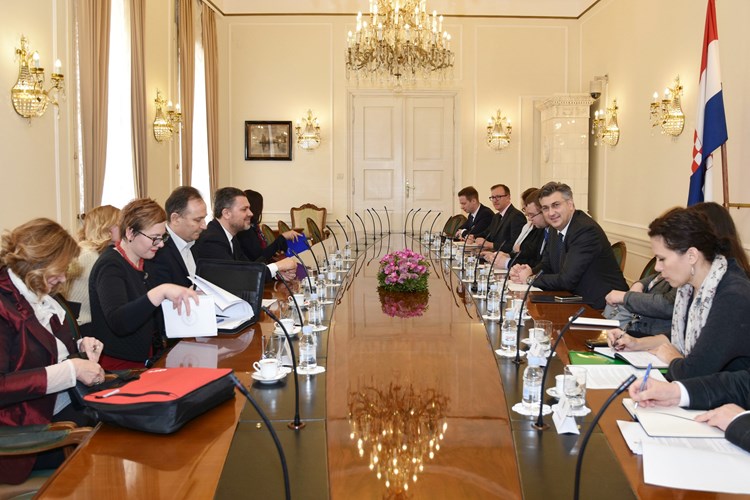- Published: 13.03.2018.
PM Plenkovic receives ETUC secretary-general
Prime Minister Andrej Plenkovic on Tuesday received the Secretary-General of the European Trade Union Confederation (ETUC), Luca Visentini, for talks and the meeting focused on ETUC's initiative for a pay rise at the European level, the need to improve social dialogue in Croatia, and the coming pension reform.
The meeting was also attended by Labour and Pension System Minister Marko Pavic and Minister for Demography, Family, Youth and Social Policy Nada Murganic as well as the president of the Union of Autonomous Trade Unions of Croatia (SSSH), Mladen Novosel, and the president of the Independent Croatian Unions, Kresimir Sever.
In a statement following the meeting, Minister Pavic said that several proposals were presented on how to improve social dialogue in Croatia and that he was convinced that cooperation with unions would become closer and that it would result in better coordination between social partners.
Pavic underscored that the government had supported ETUC's initiative for higher wages because it considered that higher wages could keep young people in Croatia.
In reference to the pension reform, Pavic informed the union leaders that it was just beginning and that unions would be involved in the entire process.
The aim of the pension reform is to obtain a sustainable pension system with adequate pension allowances, including their possible adjustment and increase, said the minister.
Pavic added that they informed Visentini that the government had raised the minimum wage by 10% last year while all previous governments had increased the minimum wage by a total of 13.4% over a period of nine years.
"The goal of this government is to make the minimum wage account for 50% of the average wage by 2020 while preserving labour intensive industries," Pavic said, adding that a "horizontal support package to be forwarded to Brussels for the leather, metal, wood and textile industries" was almost ready.
He also announced "a second step in reforms" - abolishing tax breaks for minimum wages - which he thanked the unions for initiating.
"We don't want employers to pay people a minimum wage but rather secure support for labour intensive industries and higher wages for all the others," he said.
Visentini said that the meeting showed a very clear and explicit dedication by the government to improve social dialogue in Croatia and to try and strengthen cooperation with social partners, particularly the unions.
He believes that the coming negotiations between unions and the government over the pension reform will be a delicate issue and recommended that, when embarking on the reform of the pension system, the government should not just take the budget into account but take heed of social elements, too, in order to ensure that the system was both sustainable and adequate.
The minister assured me that that would be the case, Visentini said.
He said that participants in the meeting advocated higher wages for workers and invited the government to a conference in Sofia in June to be organised by ETUC with the aim of influencing wage increases in an effort to reduce the pay gap between West and East Europe, which received a positive response from the government.
The union leaders criticised the government with regard to social dialogue, saying that the government took heed only of employers.
The prime minister doesn't know that ministers don't attend meetings of the Economic Social Council (GSV), Novosel said, adding that union representatives were not included in resolving problems and that their recommendations were not considered.
Unions are opposed to extending the retirement age because they consider that people will retire prior to turning 67 because they won't be able to satisfy employers' demands and then they will be penalised for retiring earlier, Novosel said.
Once again the government is trying to satisfy the European Commission and who knows who and not citizens, Sever said.
The only real solution for pension and health reforms, he said, is to increase wages and the base pay, which will then lead to greater contributions to the pension system.
Text: Hina
